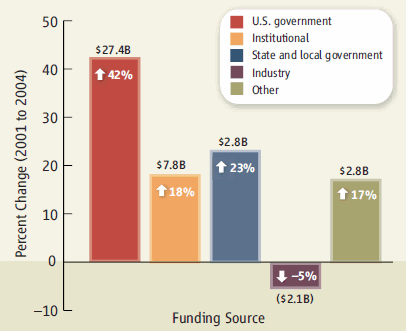|
|
|
|
|
|
|
News & Views item - May 2006 |
![]() US
Industry's Support for Universities' Research Declines. (May 7, 2006)
US
Industry's Support for Universities' Research Declines. (May 7, 2006)
The Journal Science has reported that industrial funding for U.S. academic research, which "for the past two decades" has been on the increase has now gone into decline according to a four page report from the US National Science Foundation (Industrial Funding of Academic R&D Continues to Decline in FY 2004)
The report states, "Industrial funding for research and development in academic science and engineering (S&E) dropped by 2.6 percent in FY 2004, the third consecutive year of declining support from this sector, according to data from the National Science Foundation (NSF) Survey of Research and Development Expenditures at Universities and Colleges. [It] is the first source of academic R&D funding to show a multiyear decline since the survey began, in FY 1953.
While this decline is considered to be primarily the result of a slowing economy and shrinking of company research budgets it has been suggested that the trend may continue even as the economy picks up unless companies and universities figure out how to share the fruits of industry-sponsored research, i.e. disagreements over the ownership of intellectual property may be limiting industrial support to U.S. universities as other sources increase their contributions (see chart: credit Science).

Stanley Williams, a computer scientist at Hewlett-Packard Laboratories voices a not uncommon private sector whinge, "Even if we come in with the ideas and the money, we are expected to pay a licensing fee for the product of research that we already paid for. Then we get into a negotiating dance that can take 2 years, by which time the idea is no longer viable."
Susan Butts, director of external technology at Dow Chemical Co concurs, and went on to tell Science "'Most universities receive more industry funding for research than total revenue from licensing inventions,' she says. (The ratio is 3 to 1 according to the 2004 survey of the Association of Technology Managers.) 'It doesn't make sense to jeopardize funding to try to increase licensing income.'"
While Susan Gaud, chair of the Industrial Research Institute, says, "[Funding research doesn't fit into] the increasing emphasis on short-term corporate productivity," but she told Science like Butts, she sees protracted negotiations as a contributing factor behind the current decline and a stumbling block for the future.
HP's Williams suggested that there will be an increasing trend for US industry
to move funding to overseas academics, for example those in Russia, France and
China. "We call it research by purchase order. You get on the phone, you talk to
a professor, and the professor says it'll cost this much. The research can
start the next day. And we own everything that comes out of it."
All things considered, including the mechanisms US universities must put into place and the resources allocated to deal with industrial research funding, are they losing more than they gain from the exercise? It can wind up being a small funding tail wagging a large dog.